Declassified files reveal how Tel Aviv deceived Britain about supplying Argentina’s anti-Semitic dictatorship with weapons during the 1980s, John McEvoy reports.
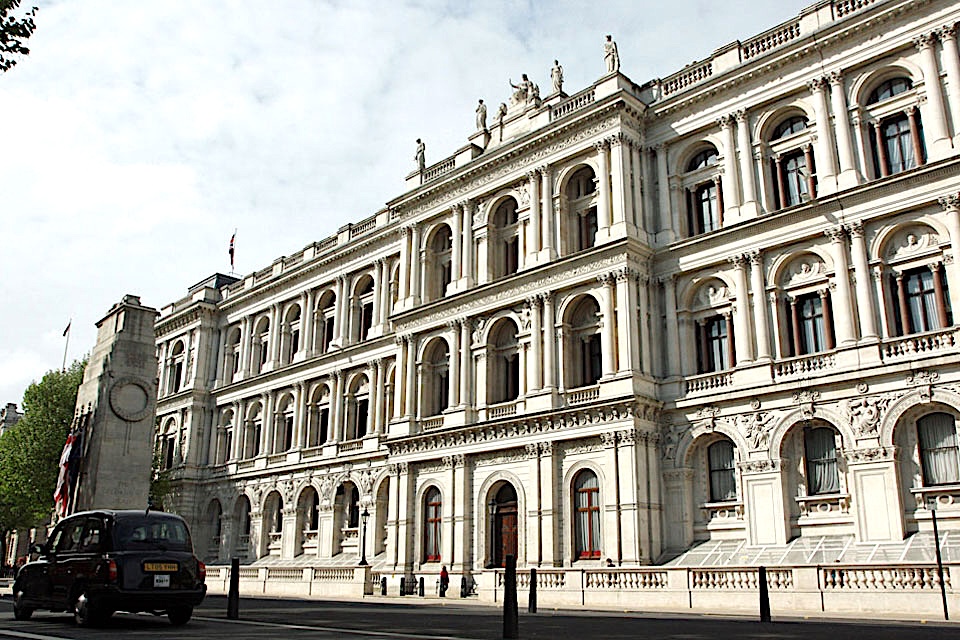
The U.K. Foreign & Commonwealth Office’s main building in London. (UK Government/Wikimedia Commons/OGL 2)
By John McEvoy
Declassified UK
- Britain suspected Israel had bugged its embassy in Tel Aviv
- Foreign Office launched propaganda operations against Israel
- U.K. still censoring files on Israel’s role in Falklands war
 Argentine forces invaded the Falkland Islands – a British territory in the South Atlantic – 43 years ago.
Argentine forces invaded the Falkland Islands – a British territory in the South Atlantic – 43 years ago.
U.K. Prime Minister Margaret Thatcher responded by dispatching a naval task force to retake the territory, pinning her political career on military success some 8,000 miles from London.
The conflict lasted for 74 days and cost the lives of over 900 people, with Thatcher scoring her highest ever public approval rating shortly after the Argentine surrender in June 1982.
“It is no exaggeration to say that… the Falklands War transformed the British political scene,” she later wrote in her memoirs. “I could feel the impact of the victory wherever I went.”
Yet victory in the Falklands was far from inevitable and Argentina’s prospects of holding onto the islands had been boosted by military support from an unlikely source: Israel.
The Argentine dictatorship was notoriously anti-Semitic. By the early 1980s, it had “disappeared” as many as 30,000 people, with a disproportionate 10 percent of those being Jewish.
Jacobo Timerman was one of the many Jewish prisoners to receive exceptionally harsh treatment in Argentine military jails decorated with Swastikas and other Nazi symbols.
Yet Argentina [as previously declassified files have shown] was able to acquire over 20 Nasher fighter jets from Israel in 1982, the year of the Falklands war, with more Israeli weapons and supplies secretly transferred through Peru.
It also used Israeli-supplied Skyhawk jets to sink four British warships, including the Sir Galahad, which resulted in the deaths of 48 soldiers.
Declassified files now reveal how Israel repeatedly misled the U.K. government about its military support to Argentina, provoking a diplomatic crisis between both countries.
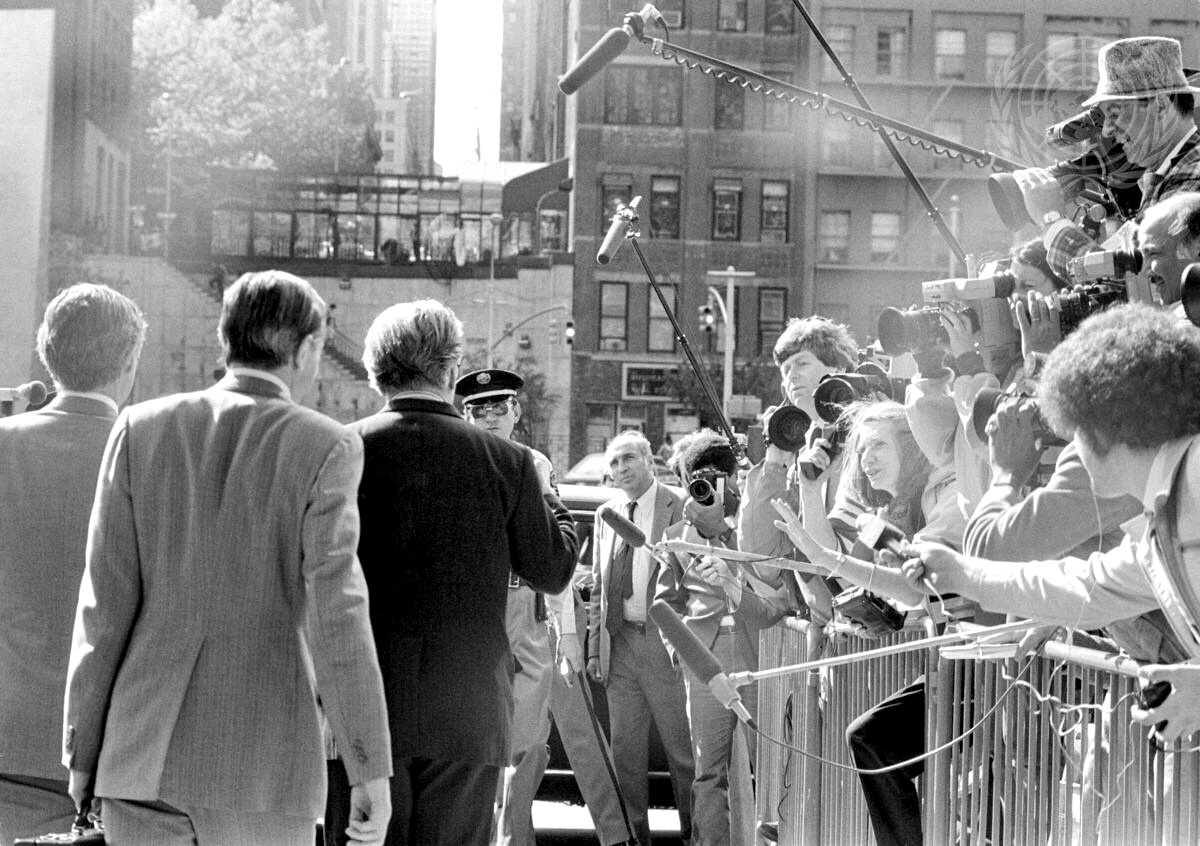
Reporters query Britain’s UN Ambassador Sir Anthony Parsons, back to camera in dark suit, emerging from talks on May 11, 1982, with U.N. Secretary-General Javier Perez de Cuellar on the Falklands/ Malvinas situation. (UN Photo/Yutaka Nagata)
The Foreign Office responded by leaking information about Israel’s activities to the British press and summoning Israeli diplomats to explain themselves. So distrustful were U.K. officials of their Israeli counterparts that they suspected the embassy in Tel Aviv had been bugged.
Yet Britain’s protests fell on deaf ears. While the Israeli government had little regard for Argentina’s claim to the Falklands (even in contrast to several British officials), it had a burgeoning arms market in Latin America to protect.
This meant that Israel sold weapons to some of the region’s most brutal regimes during the 1970s and 1980s. “Since when has ideology had anything to do with the sale of arms?” one Israeli official retorted when asked about arming Argentina.
Diversion & Deceit
During the Falklands war, the U.K. government repeatedly raised concerns about Israeli arms sales to Argentina but was batted away through diversion and deceit, the declassified files show.
“One is still left with the uneasy feeling that Israeli denial of having supplied anything to Argentina could … be got round by indirect supply of some kind which Israelis would of course be most anxious to conceal,” wrote Patrick Moberly, the U.K. ambassador in Tel Aviv, in May 1982.
In a separate dispatch, Moberly re-emphasised his frustration:
“The Israelis are accomplished at concealing information they do not want to divulge and are being extremely cagey in their response to direct questioning about anything to do with arms supplies for Argentina in the current crisis.”
By June, Moberly was becoming concerned that the Israelis were making “a gigantic effort… to pull the wool over our eyes.” After asking one Israeli official about arms reaching Argentina via third countries, he was misleadingly told: “We Israelis are not that stupid.”
The issue continued to dog the U.K.-Israel relationship even after the conflict, with the British government fearing that Argentina might launch a renewed offensive using weapons supplied by Israel.
In March 1983, Moberly observed how “the Israelis are selling arms to Argentina, but are not going to tell us what.”
Another British official noted
“we are having the worst of both worlds, with the Israelis apparently shipping aircraft to Argentina and at the same time fobbing us off with repeated denials.”
Embassy Bugged
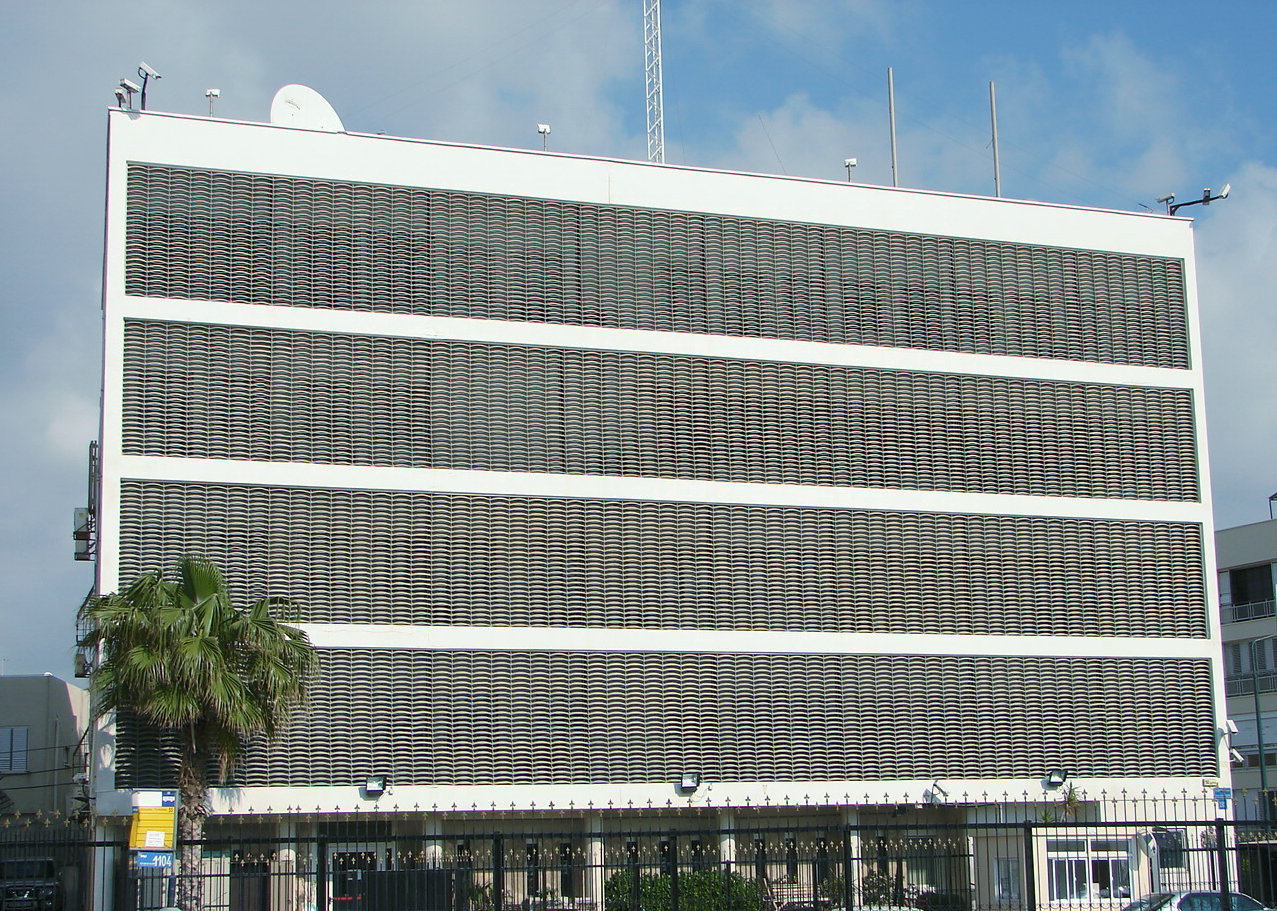
U.K. embassy building in Tel Aviv. (I, Aviad2001, CC BY 2.5, Wikimedia Commons)
In response to Israel’s obstinance, the U.K. government tried to increase the pressure on Tel Aviv through other means.
Six weeks into the conflict, the Foreign Office rang the British embassy in Tel Aviv on an open line, expecting the call to be monitored by Israeli intelligence.
“As agreed with the permanent under-secretary this morning, I spoke with Mr. Moberly on an open line to Tel Aviv,” wrote Foreign Office official David Gillmore. “I hope that the Israeli authorities were listening to this conversation,” he added.
During the conversation, Gillmore informed Moberly that “there was a growing concern in the U.K. at reports about what the Israelis were up to” and that the government “was well informed” about what was going on.
To this end, he added, it was “quite likely that the growing anger about Israeli behaviour would burst this week.”
The objective was to convey the strength of feeling about Israeli arms sales to Argentina in Britain without resorting to a formal diplomatic spat. But these efforts failed, and the U.K. government decided to take more active measures.
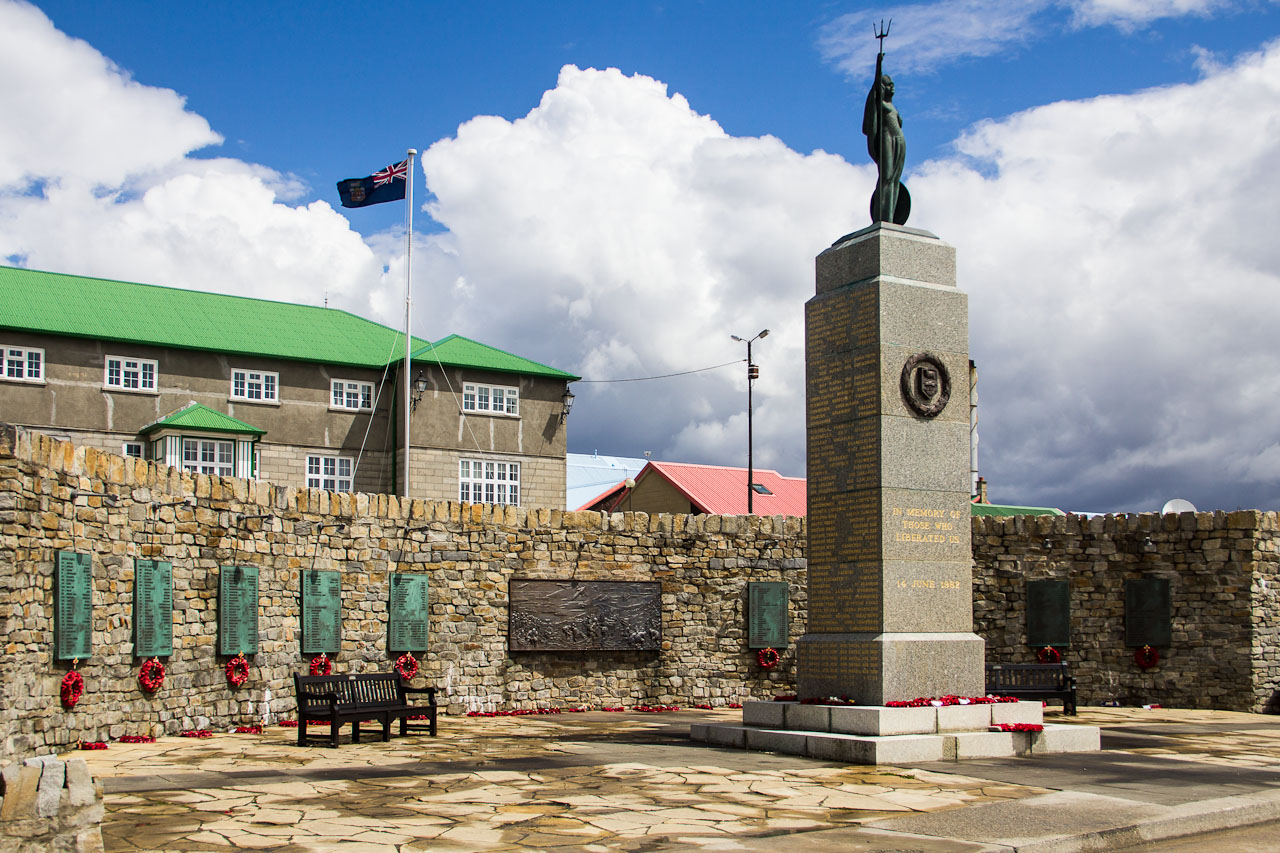
Falklands War Memorial in Stanley, capital of the Falkland Islands. (Alex Petrenko/Wikimedia Commons/CC BY-SA 3.0)
As the Falklands war progressed, the Foreign Office began to leak intelligence to the British press about Israeli arms sales to Argentina, hoping to then use those reports to confront the Israeli government about its weapons transfers.
In June 1982, Gillmore wrote in a secret cable about how he had “fed to the Insight people” at the Sunday Times detailed information about Israel’s arms sales to Argentina.
This covered alleged Argentine efforts “through a Panamanian intermediary to lodge a letter of credit with Credit Suisse in Zurich in favour of Israeli Aircraft Industries Ltd in Tel Aviv.” The Insight team was further told that the letter of credit “was for over $50 million.”
Sensitive information was also leaked to the Financial Times, with the Foreign Office hoping to use its media coverage as “a useful deterrent” by alerting banks to “the risks of becoming involved in deals which are likely soon to become public knowledge.”
Once the information had been published in the press, the Foreign Office would ring up the Israeli embassy to demand “a reaction.” It feigned ignorance about how the reports had come to light, with the Israeli ambassador being told that the Foreign Office had “at no point volunteered information to the press.”
The Israeli government reacted furiously to the negative press coverage in Britain.
Its ambassador in London forwarded to the Foreign Office letters he had received from angry Britons, declaring: “This is what we get for having, from the very outset, shown every deference and consideration for your interests.”
One of the letters was ostensibly from a serving RAF officer, who said Israel’s decision to “supply arms to the aggressor, a country that has for years harboured… Nazi criminals” had turned him into a lifelong supporter of the Palestine Liberation Organization (PLO). The letter concluded: “Long live the PLO!!!”
The Israeli government also sought to convey its anger at the Foreign Office through pro-Israel figures in Britain’s Jewish community.
Lord Sieff of Brimpton, who had worked as an adviser to the Israeli government during the late 1940s, operated as an intermediary between Tel Aviv and London.
“The message which he [Sieff] had been asked to convey to us was that the Israeli government were doing and would continue to do everything they could to prevent the supply of military equipment from Israel to Argentina; and the less that was said about this here in public the easier it would be for them to do in practice,” noted one British official.
Michael Fidler, the founder of Conservative Friends of Israel, even attempted to offer the U.K. government a categorical assurance that no arms had been supplied by Israel to Argentina either directly or indirectly since the start of the Falklands crisis. This was a claim that the Israeli government was not even prepared to make.
Such approaches were received with little patience. The Israeli ambassador in London was told plainly that “the simplest way to end it [negative publicity] would be to stop all current arms deliveries” to Argentina.
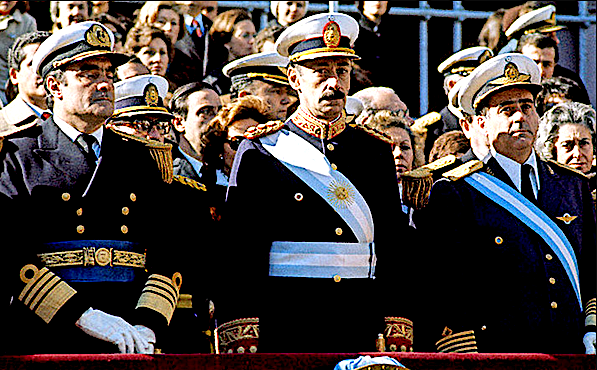
Members of the Argentine junta at a military parade in Buenos Aires, July 1978. From left: Admiral Emilio Massera, Lieutenant General Jorge Videla and Brigadier General Orlando Agosti. (Argentine government/Wikimedia Commons/Public domain)
With patience wearing thin in London, Foreign Office officials began to issue scathing remarks about their Israeli counterparts.
“Withdrawal from occupied territory is not exactly [a] convincing line of argument with Israelis who will be quick to see its implications for their own situation,” one wrote in reference to Israel’s occupation of Palestine. “The Israelis have always had a special way of looking at the rest of the world,” Moberly added.
The issue of anti-Semitism within the Argentine dictatorship was also raised, with the Israeli ambassador in London being pressed that “British public opinion will not understand why you should sell arms to a regime you fear may be anti-Semitic.”
The Israeli government suggested that selling arms to the Argentine dictatorship might improve conditions for the country’s Jewish community – despite anti-Semitism in Argentina consistently rising through the early 1980s.
Yet the key motivation for Israel’s support to Argentina was clear.
“The present crisis” in the Falklands offered Israel “an extremely attractive opportunity to develop the arms market in Argentina and Latin America, with great potential long-term benefit to Israel”, one Israeli diplomat in London confessed.
The Israeli government also viewed arms sales to Argentina as a “bargaining chip to exert pressure on Britain to halt its own sale of weapons to Israel’s Arab adversaries” and loosen London’s arms restrictions on Tel Aviv.
While these revelations come from Foreign Office documents, Britain’s Ministry of Defence is still censoring files about Israel’s role in the Falklands war. Declassified is trying to obtain them via the Freedom of Information Act.
John McEvoy is acting chief investigator for Declassified UK. John is a historian and filmmaker whose work focuses on British foreign policy and Latin America. His PhD was on Britain’s Secret Wars in Colombia between 1948 and 2009, and he is currently working on a documentary about Britain’s role in the rise of Augusto Pinochet.
This article is from Declassified UK.
Views expressed in this article may or may not reflect those of Consortium News.

It is perhaps even more curious that British media have largely ignored their own government’s role in supporting and militarily supplying the National Reorganization Process junta in Argentina (1976-83) all the way up to the moment that Leopoldo Galtieri’s regime launched the Malvinas campaign to annex the Falkland Islands and South Georgia in 1982, as documented by researchers such as Grace Livingstone (for instance, see her Declassified UK article “Margaret Thatcher’s Secret Dealings with the Argentine Military Junta That Invaded the Falklands,” first published in South Africa’s “The Daily Maverick” news website on January 29, 2020, and her 2018 academic book “Britain and the Dictatorships of Argentina and Chile, 1973-82,” available at tinyurl.com/UKArgentinaChile1973-82).
For more details on the Israeli role in Latin America (even rubbing shoulders with fugitive Nazi war criminals, as also documented by researchers such as Danny Orbach, Eitay Mack, Benjamin Beit-Hallahmi, and Antony Loewenstein), see my multiple comments on the following articles syndicated by Consortium News: Dan Cohen, “The Secret History of Israel’s Role in Genocide in Colombia,” May 13, 2024, and Vijay Prashad, “A Journalism of Defiance,” March 31, 2025.
Based on simple geography, it seems the Malvinas Islands should by rights belong to Argentina and not the fading British Empire.
Firstly, how curious that the mainstream UK media has chosen to ignore this issue.
Next, “It is no exaggeration to say that… the Falklands War transformed the British political scene,” she later wrote in her memoirs. “I could feel the impact of the victory wherever I went.”
I think that this is an exaggeration. An apparently successful military operation or war does not confer obvious long-term benefits on the incumbent.
President George H.W. Bush demonstrated that in 1991 after the Gulf War. In 1992, he tried to cash in on that conflict but voters were simply not interested and he lost. Going on about the war probably cost him support because he was unable to talk about things that voters were more concerned about.
An even more obvious example came with Winston Churchill and the Conservatives in 1945 who went down to a substantial defeat not long after the war in Europe had ended.
So why does the Falklands War appear to be an exception? I do not think that it was. The Conservative Party had probably reached the depths of unpopularity in late 1981 and any subsequent recovery in the polls was disguised by the boost that it also got from the Falklands War. And then, when the war ended, that continued recovery was maintained as the ‘Falklands Factor’ faded.